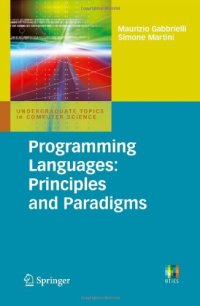
Ebook: Programming Languages: Principles and Paradigms
- Tags: Computer Science general, Programming Languages Compilers Interpreters
- Series: Undergraduate Topics in Computer Science
- Year: 2010
- Publisher: Springer-Verlag London
- Edition: 1
- Language: English
- pdf
This excellent addition to the UTiCS series of undergraduate textbooks provides a detailed and up to date description of the main principles behind the design and implementation of modern programming languages.
Rather than focusing on a specific language, the book identifies the most important principles shared by large classes of languages. To complete this general approach, detailed descriptions of the main programming paradigms, namely imperative, object-oriented, functional and logic are given, analysed in depth and compared. This provides the basis for a critical understanding of most of the programming languages.
An historical viewpoint is also included, discussing the evolution of programming languages, and to provide a context for most of the constructs in use today. The book concludes with two chapters which introduce basic notions of syntax, semantics and computability, to provide a completely rounded picture of what constitutes a programming language.
This self-contained textbook assumes that the reader has some familiarity with one programming language, and adopts a simple yet rigorous approach.
The author explains the main programming paradigms (imperative, object-oriented, functional, and logic), and makes clear separation between the design, implementation and pragmatic aspects of programming languages.
As well as an excellent guide for undergraduates the content will also be useful for software practitioners who want to consolidate and update their knowledge of programming languages.